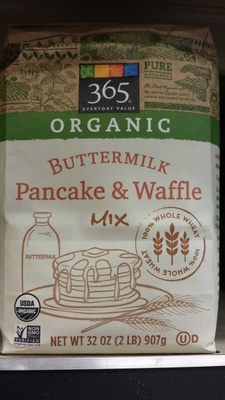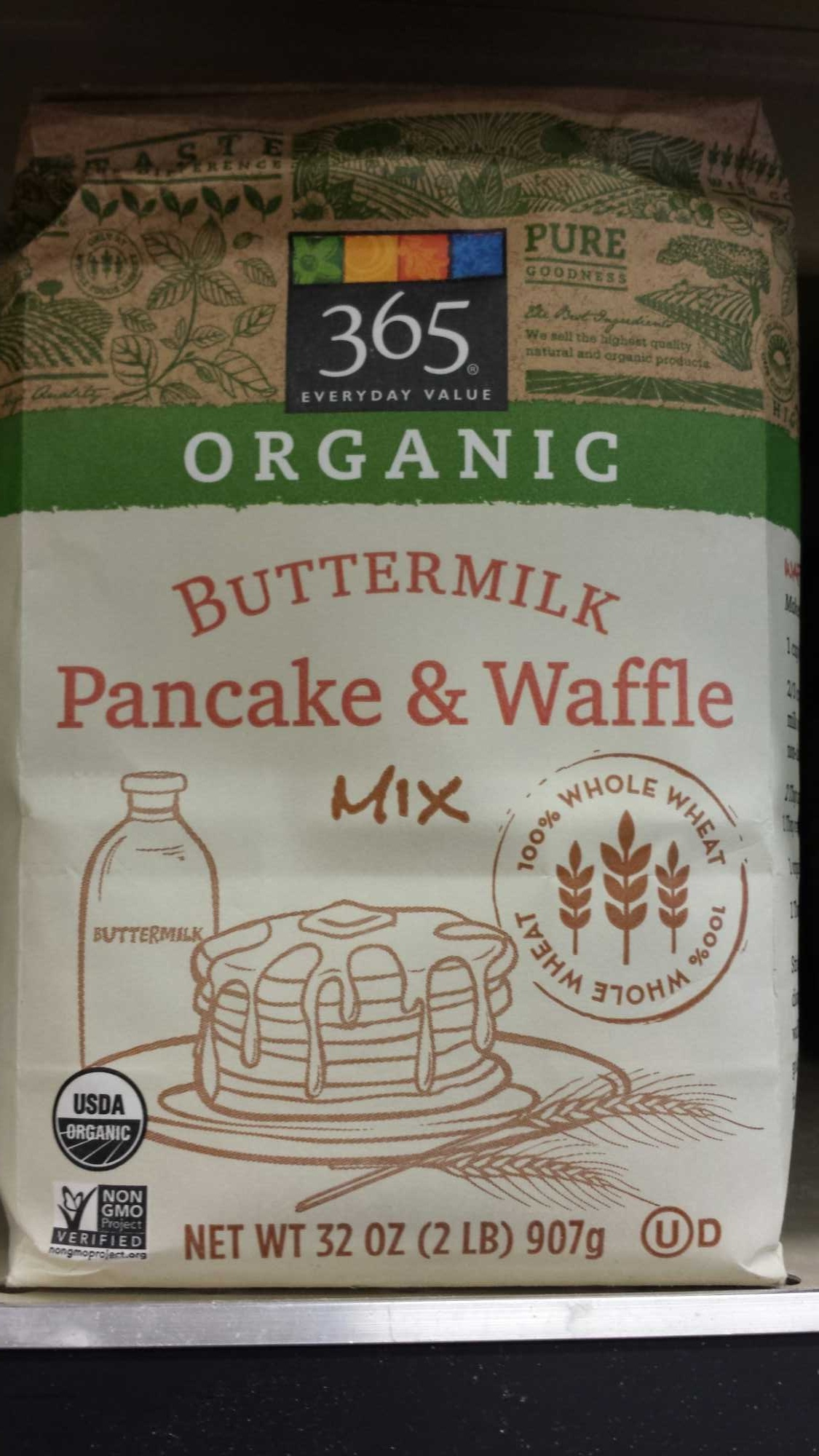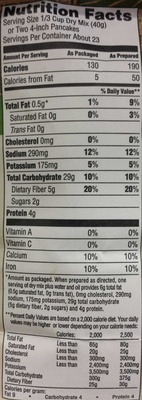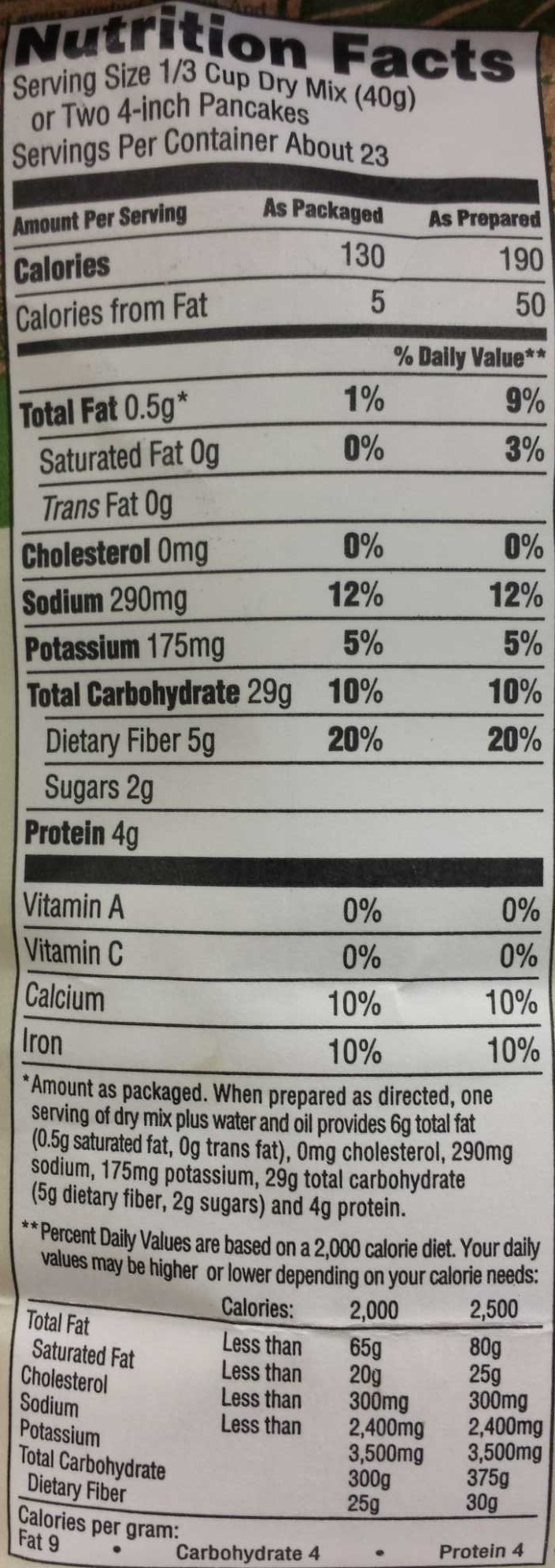Help us make food transparency the norm!
As a non-profit organization, we depend on your donations to continue informing consumers around the world about what they eat.
The food revolution starts with you!
Whole wheat buttermilk pancake & waffle mix, whole wheat buttermilk - 365 - 23 servings
Whole wheat buttermilk pancake & waffle mix, whole wheat buttermilk - 365 - 23 servings
This product page is not complete. You can help to complete it by editing it and adding more data from the photos we have, or by taking more photos using the app for Android or iPhone/iPad. Thank you!
×
Barcode: 0099482424534 (EAN / EAN-13) 099482424534 (UPC / UPC-A)
Quantity: 23 servings
Brands: 365, 365 Everyday Value, Whole Foods Market Inc.
Brand owner: Whole Foods Market, Inc.
Categories: Plant-based foods and beverages, Plant-based foods, Snacks, Breakfasts, Seeds, Sweet snacks, Biscuits and cakes, Crêpes and galettes, Cakes, Cooking helpers, Dessert mixes, Pastries, Pastry helpers, Baking Mixes, Waffles, Cake mixes, Pancake mixes, Pancakes, Waffle mix
Labels, certifications, awards:
Organic, No GMOs, USDA Organic, Non GMO project

Stores: Whole Foods
Countries where sold: United States
Matching with your preferences
Health
Ingredients
-
11 ingredients
ORGANIC WHOLE WHEAT FLOUR, ORGANIC BUTTERMILK POWDER, BAKING POWDER (SODIUM ACID PYROPHOSPHATE, SODIUM BICARBONATE, CORNSTARCH, MONOCALCIUM PHOSPHATE), ORGANIC CANE SUGAR, SEA SALT, BAKING SODA (SODIUM BICARBONATE).Allergens: Gluten
Food processing
-
Ultra processed foods
Elements that indicate the product is in the 4 - Ultra processed food and drink products group:
- Additive: E450 - Diphosphates
Food products are classified into 4 groups according to their degree of processing:
- Unprocessed or minimally processed foods
- Processed culinary ingredients
- Processed foods
- Ultra processed foods
The determination of the group is based on the category of the product and on the ingredients it contains.
Additives
-
E341 - Calcium phosphates
Calcium phosphate: Calcium phosphate is a family of materials and minerals containing calcium ions -Ca2+- together with inorganic phosphate anions. Some so-called calcium phosphates contain oxide and hydroxide as well. They are white solids of nutritious value.Source: Wikipedia
-
E341i - Monocalcium phosphate
Calcium phosphate: Calcium phosphate is a family of materials and minerals containing calcium ions -Ca2+- together with inorganic phosphate anions. Some so-called calcium phosphates contain oxide and hydroxide as well. They are white solids of nutritious value.Source: Wikipedia
-
E450 - Diphosphates
Diphosphates (E450) are food additives often utilized to modify the texture of products, acting as leavening agents in baking and preventing the coagulation of canned food.
These salts can stabilize whipped cream and are also found in powdered products to maintain their flow properties. They are commonly present in baked goods, processed meats, and soft drinks.
Derived from phosphoric acid, they're part of our daily phosphate intake, which often surpasses recommended levels due to the prevalence of phosphates in processed foods and drinks.
Excessive phosphate consumption is linked to health issues, such as impaired kidney function and weakened bone health. Though diphosphates are generally regarded as safe when consumed within established acceptable daily intakes, it's imperative to monitor overall phosphate consumption to maintain optimal health.
-
E500 - Sodium carbonates
Sodium carbonates (E500) are compounds commonly used in food preparation as leavening agents, helping baked goods rise by releasing carbon dioxide when they interact with acids.
Often found in baking soda, they regulate the pH of food, preventing it from becoming too acidic or too alkaline. In the culinary world, sodium carbonates can also enhance the texture and structure of foods, such as noodles, by modifying the gluten network.
Generally recognized as safe, sodium carbonates are non-toxic when consumed in typical amounts found in food.
-
E500ii - Sodium hydrogen carbonate
Sodium hydrogen carbonate, also known as E500ii, is a food additive commonly used as a leavening agent.
When added to recipes, it releases carbon dioxide gas upon exposure to heat or acids, causing dough to rise and resulting in a light, fluffy texture in baked goods.
It is generally recognized as safe (GRAS) by regulatory authorities when used in appropriate quantities and poses no significant health risks when consumed in typical food applications.
Ingredients analysis
-
Palm oil free
No ingredients containing palm oil detected
-
Non-vegan
Non-vegan ingredients: Buttermilk
-
Vegetarian
No non-vegetarian ingredients detected
-
Details of the analysis of the ingredients
: WHOLE WHEAT FLOUR, BUTTERMILK, BAKING POWDER (SODIUM ACID PYROPHOSPHATE, SODIUM BICARBONATE, CORNSTARCH, MONOCALCIUM PHOSPHATE), CANE SUGAR, SEA SALT, BAKING SODA (SODIUM BICARBONATE)- WHOLE WHEAT FLOUR -> en:whole-wheat-flour - labels: en:organic - vegan: yes - vegetarian: yes - ciqual_proxy_food_code: 9410 - percent_min: 16.6666666666667 - percent_max: 100
- BUTTERMILK -> en:buttermilk - labels: en:organic - vegan: no - vegetarian: yes - ciqual_food_code: 19801 - percent_min: 0 - percent_max: 50
- BAKING POWDER -> en:baking-powder - vegan: yes - vegetarian: yes - ciqual_food_code: 11046 - percent_min: 0 - percent_max: 33.3333333333333
- SODIUM ACID PYROPHOSPHATE -> en:e450i - vegan: yes - vegetarian: yes - percent_min: 0 - percent_max: 33.3333333333333
- SODIUM BICARBONATE -> en:e500ii - vegan: yes - vegetarian: yes - percent_min: 0 - percent_max: 16.6666666666667
- CORNSTARCH -> en:corn-starch - vegan: yes - vegetarian: yes - ciqual_food_code: 9510 - percent_min: 0 - percent_max: 11.1111111111111
- MONOCALCIUM PHOSPHATE -> en:e341i - vegan: yes - vegetarian: yes - percent_min: 0 - percent_max: 8.33333333333333
- CANE SUGAR -> en:cane-sugar - labels: en:organic - vegan: yes - vegetarian: yes - ciqual_proxy_food_code: 31016 - percent_min: 0 - percent_max: 5
- SEA SALT -> en:sea-salt - vegan: yes - vegetarian: yes - ciqual_food_code: 11082 - percent_min: 0 - percent_max: 4.53
- BAKING SODA -> en:e500ii - vegan: yes - vegetarian: yes - percent_min: 0 - percent_max: 4.53
- SODIUM BICARBONATE -> en:e500ii - vegan: yes - vegetarian: yes - percent_min: 0 - percent_max: 4.53
Nutrition
-
Missing data to compute the Nutri-Score
Missing nutrition facts
⚠ ️The nutrition facts of the product must be specified in order to compute the Nutri-Score.Could you add the information needed to compute the Nutri-Score? Add nutrition facts
-
Nutrient levels
-
Fat in low quantity (9%)
What you need to know- A high consumption of fat, especially saturated fats, can raise cholesterol, which increases the risk of heart diseases.
Recommendation: Limit the consumption of fat and saturated fat- Choose products with lower fat and saturated fat content.
-
Saturated fat in low quantity (3%)
What you need to know- A high consumption of fat, especially saturated fats, can raise cholesterol, which increases the risk of heart diseases.
Recommendation: Limit the consumption of fat and saturated fat- Choose products with lower fat and saturated fat content.
-
Sugars in moderate quantity (0%)
What you need to know- A high consumption of sugar can cause weight gain and tooth decay. It also augments the risk of type 2 diabetes and cardio-vascular diseases.
Recommendation: Limit the consumption of sugar and sugary drinks- Sugary drinks (such as sodas, fruit beverages, and fruit juices and nectars) should be limited as much as possible (no more than 1 glass a day).
- Choose products with lower sugar content and reduce the consumption of products with added sugars.
-
Salt in high quantity (0%)
What you need to know- A high consumption of salt (or sodium) can cause raised blood pressure, which can increase the risk of heart disease and stroke.
- Many people who have high blood pressure do not know it, as there are often no symptoms.
- Most people consume too much salt (on average 9 to 12 grams per day), around twice the recommended maximum level of intake.
Recommendation: Limit the consumption of salt and salted food- Reduce the quantity of salt used when cooking, and don't salt again at the table.
- Limit the consumption of salty snacks and choose products with lower salt content.
-
-
Nutrition facts
Nutrition facts As sold
for 100 g / 100 mlPrepared
for 100 g / 100 mlPrepared
per serving (1/3 cup (40 g))Compared to: Pancakes Energy 1,360 kj
(325 kcal)795 kj
(190 kcal)318 kj
(76 kcal)+13% Fat 1.25 g 9 g 3.6 g -85% Saturated fat 0 g 3 g 1.2 g -100% Trans fat 0 g ? ? Cholesterol 0 mg 0 mg 0 mg -100% Carbohydrates 72.5 g 10 g 4 g +82% Sugars 5 g ? ? -59% Fiber 12.5 g 20 g 8 g +531% Proteins 25 g ? ? +185% Salt 4.53 g ? ? +374% Vitamin A 0 µg ? ? -100% Vitamin C (ascorbic acid) 0 mg ? ? Potassium 1,120 mg ? ? +1,349% Calcium 688 mg ? ? +549% Iron 13.1 mg ? ? +340% Fruits‚ vegetables‚ nuts and rapeseed‚ walnut and olive oils (estimate from ingredients list analysis) 0 % ? ?
Environment
-
Eco-Score C - Moderate environmental impact
⚠ ️Select a country in order to include the full impact of transportation.The Eco-Score is an experimental score that summarizes the environmental impacts of food products.→ The Eco-Score was initially developped for France and it is being extended to other European countries. The Eco-Score formula is subject to change as it is regularly improved to make it more precise and better suited to each country.Life cycle analysis
-
Average impact of products of the same category: B (Score: 76/100)
Category: Soft waffle (Brussels-style), plain or with sugar, prepacked
Category: Soft waffle (Brussels-style), plain or with sugar, prepacked
- PEF environmental score: 0.31 (the lower the score, the lower the impact)
- including impact on climate change: 2.61 kg CO2 eq/kg of product
Stage Impact Agriculture
75.6 %Processing
13.2 %Packaging
6.2 %Transportation
3.5 %Distribution
1.6 %Consumption
0.0 %
Bonuses and maluses
-
Missing origins of ingredients information
Malus: -5
⚠ ️ The origins of the ingredients of this product are not indicated.
If they are indicated on the packaging, you can modify the product sheet and add them.
If you are the manufacturer of this product, you can send us the information with our free platform for producers.
-
Missing packaging information for this product
Malus: -15
⚠ ️ The information about the packaging of this product is not filled in.⚠ ️ For a more precise calculation of the Eco-Score, you can modify the product page and add them.
If you are the manufacturer of this product, you can send us the information with our free platform for producers.
Eco-Score for this product
-
Impact for this product: C (Score: 56/100)
Product: Whole wheat buttermilk pancake & waffle mix, whole wheat buttermilk - 365 - 23 servings
Life cycle analysis score: 76
Sum of bonuses and maluses: -20
Final score: 56/100
-
Carbon footprint
-
Equal to driving 1.4 km in a petrol car
261 g CO² per 100g of product
The carbon emission figure comes from ADEME's Agribalyse database, for the category: Soft waffle (Brussels-style), plain or with sugar, prepacked (Source: ADEME Agribalyse Database)
Stage Impact Agriculture
74.6 %Processing
8.6 %Packaging
11.0 %Transportation
5.0 %Distribution
0.7 %Consumption
0.0 %
Packaging
-
Missing packaging information for this product
⚠ ️ The information about the packaging of this product is not filled in.Take a photo of the recycling information Take a photo of the recycling information
Transportation
-
Origins of ingredients
Missing origins of ingredients information
⚠ ️ The origins of the ingredients of this product are not indicated.
If they are indicated on the packaging, you can modify the product sheet and add them.
If you are the manufacturer of this product, you can send us the information with our free platform for producers.Add the origins of ingredients for this product Add the origins of ingredients for this product
Report a problem
-
Incomplete or incorrect information?
Category, labels, ingredients, allergens, nutritional information, photos etc.
If the information does not match the information on the packaging, please complete or correct it. Open Food Facts is a collaborative database, and every contribution is useful for all.
Data sources
Product added on by bori
Last edit of product page on by gmlaa.
Product page also edited by org-database-usda, roboto-app, usda-ndb-import.











